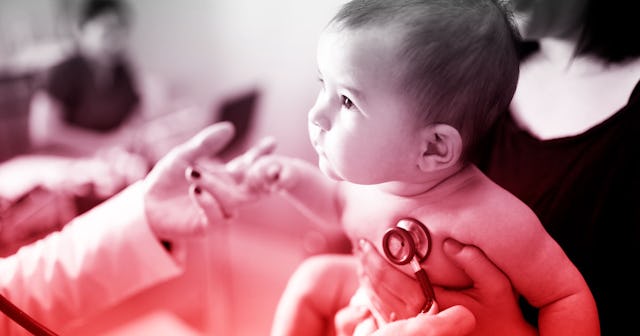The AAP Recommends That All Kids Be Screened For Cardiac Issues

In my line of work, as the director of programs for a heart health organization called Harboring Hearts, my work supports pediatric and adult heart surgery patients. While we don’t hear or often talk about youth and heart conditions, they do exist. Some kids are born with congenital heart defects which follow them their entire lives while others can develop over time. We’ve heard of child athletes who collapse during practice or a game but we don’t hear much about the teenagers and children who suffer from cardiac arrest. Recently, the American Academy of Pediatrics suggested that all children should be screened for potential heart problems. Let’s talk about why cardiac screenings are important for all people, of all ages and races.
Heart conditions do not discriminate and neither should we. People with a family history of heart conditions should automatically be screened from time to time beginning in adolescents. Like HPV screenings and vaccinations can be given as early as 9 years old, screenings for cardiac issues should not be a taboo discussion or one we are afraid to have. In our culture, we often approach issues in a reactionary way instead of a proactive way. With the recent cardiac arrest of Danish soccer player Christian Erikson, who ultimately underwent heart surgery after being rushed to the hospital after collapsing during a soccer game, the idea of screening youth for cardiac issues is back on the table for discussion.
Many heart issues are quiet and don’t have any symptoms; death can be sudden, especially in youth. While we know that kids who play sports hearts are working to keep up with their exercising, their adrenaline can increase simply because they are watching a scary movie or when they get very angry and have an outburst. As parents, we need to pay attention to our kids’ bodies, their health, and be their advocates, especially in the doctor’s office. According to the Texas Heart Institute, “Heart disease is not a major cause of death among children and teenagers, but it is the largest cause of death among adults in the United States. In fact, someone in America dies every 37 seconds from some form of cardiovascular disease.” Heart disease is real, and serious, and something my own mother died from. I am extra protective of my own heart and that of my kids.
FatCamera/Getty
While the rate is low for kids being diagnosed with heart disease, there are medications which increase the chances of them having a heart issue, like certain medications kids might take for mental health issues. My son, a young Black male, has a higher chance of heart disease because of the medication he takes for his ADHD. Medications frequently prescribed for ADHD, like Ritalin or Concerta, may make the risk of heart disease two times as likely, according to a study out of Denmark.
In research from the Texas Heart Institute, “Less than 15% of children have high cholesterol levels, but studies have shown that fatty plaque buildup begins in childhood and progresses into adulthood. This disease process is called atherosclerosis. In time, atherosclerosis leads to heart disease, which is the single biggest cause of death in the United States.” We are doing our kids an injustice by not getting them screened for cardiac issues. Also the Standard American Diet (SAD) isn’t the best either, and for that, is reason enough to get our kids screened as early as possible for potential cardiac issues.
The recent suggestions by the American Academy of Pediatrics suggest practitioners update their medical forms to include questions to determine if your child is at a higher risk to have cardiac arrest. Their suggested questions range from asking if your child has passed out without warning or fainted, if a family member under the age of 50 has died from sudden heart problems, if anyone in the family has heart problems which are often hereditary like cardiomyopathy or Marfan syndrome. If a child answers yes to any of these questions, doctors will go a step further in their evaluation of the child’s cardiac health.
Kids are humans too, and their bodies are made up just like adults, with the same organs. Kids should also have access to the same screenings adults have especially when it comes to their heart health. Like many health issues, if caught early, they can be addressed. Screening our kids for cardiac issues can help them in the long run. If your doctor is not screening your child for heart issues, you have the right to ask that they do. Your kids’ doctor is a part of your village, the part that has a mandate to keep them safe and healthy. We must work together. Even though a cardiac screening sounds scary, it would be scarier to stand at the bedside of your kid after heart surgery or worse, death.